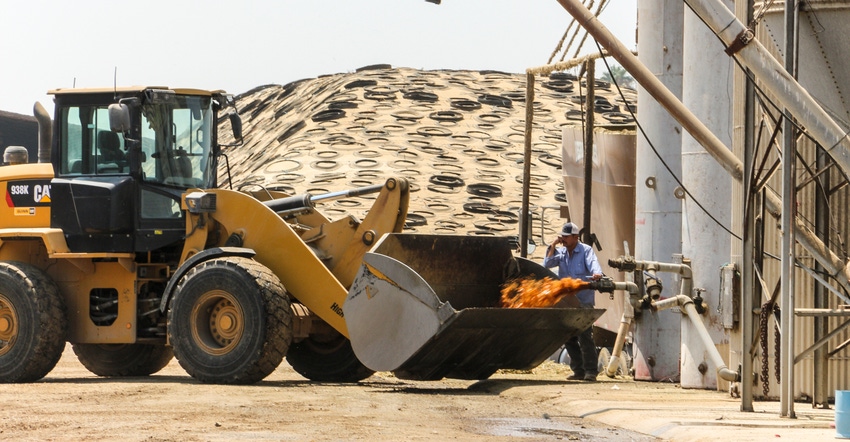
Farms that use agricultural byproducts for animal feed, bedding materials, and dust control may lose those through a bill now in the California Senate.
Assembly Bill 2959 will force the unfranchised hauling of organic byproducts from grocery stores, restaurants, breweries, and wineries to be subjected to the same franchise agreements municipalities now have with select companies. Some fear the bill will go further as unintended consequences are realized.
Louie Brown, a lobbyist representing the California Grocers Association, says the bill addresses grocers, retailers, and restaurants. There remains some confusion about the bill's effect on the sale of hulls and shells from tree nuts, though most agree it will include the byproducts of wine making, citrus juice processing and breweries.
What he does know is the bill will further compound the challenges of meeting state mandates to divert organic waste away from landfills.
"California cannot meet its organic diversion goals now," Brown said. "Let's do the best we can with the waste we now have without making the problem worse."
Small hauling companies and those who represent them say the bill is even more troubling as it furthers the monopoly solid waste companies now have through their franchise agreements with municipalities.
Livestock producers
Frank Konyn owns a dairy near Escondido, Calif. and uses the feed byproducts from local companies to feed his cows. If approved, the proposed law would ban him from hauling those byproducts to his farm. Under current practices, livestock producers pay a nominal fee to haulers to have organic byproducts delivered. These products tend to be less expensive than other feed sources while providing proper nutrition for livestock.
For Konyn, who buys the organic byproducts and sell it to livestock producers, this would destroy a business model others like him successfully employ.
This turns the business model of paying the producers of organic byproducts for their materials on its head. The bill will force these producers – wineries, breweries, and juice processors – to pay to remove these byproducts, rather than being paid for them. Only the franchise companies with licenses issued by local municipalities would have the authority to haul these products. Konyn says these companies do not have the infrastructure or ability to effectively haul these byproducts.
Where will these byproducts wind up if they cannot be sold to livestock operations? Konyn says it will end up in landfills in California or neighboring states. He says he has evidence to support that some of these materials are being diverted by municipal hauling companies to other states. Moreover, there are concerns that composted materials created by some of these companies contain items strictly forbidden by law.
Under the bill, producers of these byproducts would need to pay franchise waste haulers to remove these byproducts, rather than have someone pay to take them.
Existing Law
The Integrated Waste Management Act demands California divert 75 percent of its solid waste from landfills, effective this year. Furthermore, climate change legislation passed in 2006 demands that the state reduce its greenhouse gas emissions. Included in this are ideas to regulate how organic byproducts are handled because of their implications with greenhouse gasses.
The state's waste diversion goals can be done through source reduction, recycling, and composting. Current law regulates composting by practice and source material. Certain products cannot be composted and used on crops because of food safety concerns.
Confusion
There appears to be some disagreement over how the proposal could impact large hulling and shelling operations that recycle the byproducts from almond, pistachio, and walnut processing.
Roger Isom, president of the California-based Western Ag Processors Association, says he is assured the bill will not affect his member tree nut processors.
Anja Raudabaugh, president of Western United Dairymen in Modesto, Calif., believes the opposite is true and the bill will impact her members' ability to buy hulls for feed and shells for bedding materials. If nothing else, it will start with bakery and citrus processing byproducts, something Konyne believes is also the case, and expand to hullers and shellers as the solid waste lobby successfully works to protect its monopoly.
Current proponents of the legislation include:
The California Waste & Recycling Association
Californians Against Waste
Recology
Republic Services, Inc.
Resource Recovery Coalition of California; and,
South Bayside Waste Management Authority (ReThink Waste)
Conversely, there is a lengthy and diverse list in opposition to the bill, including the Almond Alliance of California, Association of California Egg Farmers, California Advanced Biofuels, the California Grain and Feed Association, Western United Dairymen, several dairies and 19 individuals.
"We were trying to stay neutral on this up to a couple weeks ago," Raudabaugh said. All that changed as it became clear that the bill's author, Ian Calderon, who represents suburban neighborhoods east if Los Angeles, was uninterested in working with a coalition of agricultural interests, including Western United, Western Growers Association and the California Farm Bureau Federation.
Going backwards
As a lobbyist well-informed on agricultural issues and state environmental mandates such as recycling and greenhouse gas emission, Brown sees California moving backwards from its stated goals of reducing greenhouse gas emissions and limiting solid waste hauled to landfills.
Brown said the Environmental Protection Agency determined that feeding organic byproducts to livestock is the highest and best means to recycle these byproducts. He says state officials are not willing to discuss this hierarchy of best-use practices of agricultural products created by the EPA under the Obama Administration, because it clouds the franchise agreements these waste haulers have with municipalities.
Still, others are concerned that the move will politically force these waste haulers with no experience in or infrastructure to handle organic byproducts to covertly comingle products with compost or simply divert it to landfills in direct opposition to state mandates.
[Note: The headline and story were slightly modified from an earlier version to clarify differences of opinion about the potential impact of the bill.]
About the Author(s)
You May Also Like






